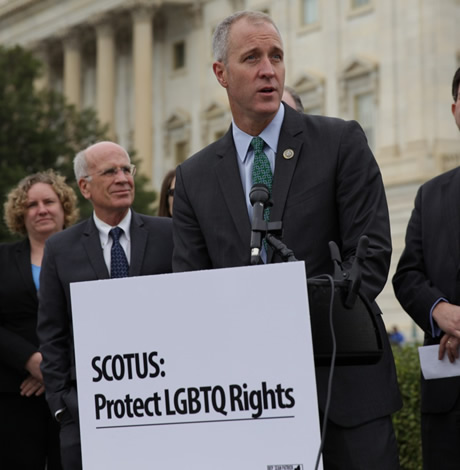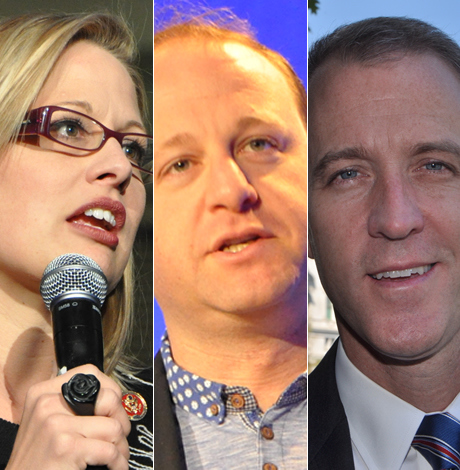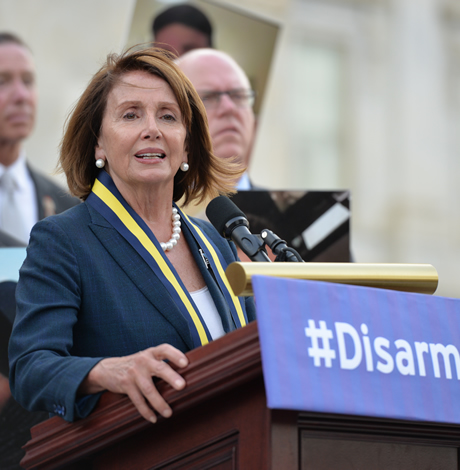National
LGBT caucus absent from jobs letter to Obama
Progressive caucuses seek meeting with president

A letter from several congressional caucuses to President Obama on the country’s high unemployment rate has a notable group absent from its list of signers: the LGBT Equality Caucus.
The caucus, which is dedicated to advancing LGBT rights, isn’t a signer of a Sept. 6 letter to Obama requesting a meeting to discuss the jobless rate in the country and possible solutions to find work for more people.
“With unemployment at 9.1 percent nationally — approaching 12 percent in the Hispanic community, 16.7 percent in the African American community and with Asian American and Pacific Islanders remaining unemployed for longer periods than any other group — we are in a national crisis,” the letter states. “We have learned throughout American history that big, bold action is required to put people back to work and promote economic growth.”
Chairs of the Congressional Asian & Pacific American Caucus, the Congressional Black Caucus, the Congressional Hispanic Caucus and the Congressional Progressive Caucus penned their names to the letter.
But the LGBT Equality Caucus isn’t among the signers even though LGBT workers have no federal non-discrimination protections, which threatens their job security. Firing a person based on sexual orientation is legal in 29 states, while firing someone based on gender identity is legal in 35 states.
A spokesperson for the LGBT Equality Caucus didn’t immediately respond to a request for comment. It wasn’t clear whether the LGBT Equality Caucus was asked to sign the letter.
An informed source said the Congressional Black and Congressional Progressive caucuses were responsible for spearheading the initiative and circulating the letter among other groups. These groups didn’t immediately respond to a request to comment.
The letter was sent out days prior to the joint session of Congress on Thursday in which President Obama is set to unveil his plan to stimulate job creation. Some advocates had been hoping the speech would be LGBT inclusive and Obama would mention the lack of federal non-discrimation protections for LGBT workers.
Obama has expressed support for the Employment Non-Discrimination Act, but the legislation has remained stalled and didn’t have a committee vote in the last Congress when Democrats controlled the U.S. House. As an interim alternative to passing ENDA, some LGBT rights supporters have been calling on Obama to issue an executive order barring the U.S. government from contracting with companies without non-discrimination protections for workers based on sexual orientation and gender identity.
Paul Yandura, a gay Democratic activist, said he hopes that even though the LGBT Equality Caucus isn’t a signer of the letter, the group is still working to address to the lack of federal non-discrimination protections for LGBT workers.
“With the dismal to non-existent prospects for passage of LGBT priority legislation, I hope that, at the very least, they are doing everything they can to ensure that those in our community that are not the privileged class — which is most of the community — have strong advocates on their behalf in this stalled economy,” Yandura said.
The full text of the letter follows:
September 6, 2011
The Honorable Barack Obama
1600 Pennsylvania Ave.
Washington, DC 20500
Dear Mr. President:
As chairs of the Congressional Asian and Pacific American Caucus,
Congressional Black Caucus, Congressional Hispanic Caucus and Congressional Progressive Caucus representing more than half of the Democratic members of the U.S. House of Representatives, we are requesting a meeting with you regarding your upcoming speech to the nation on job creation. With unemployment at 9.1% nationally — approaching 12% in the Hispanic community, 16.7% in the African American community and with Asian American and Pacific
Islanders remaining unemployed for longer periods than any other group— we are in a national crisis. We have learned throughout American history that big, bold action is required to put people back to work and promote economic growth.
Throughout the month of August, we heard repeatedly from our constituents
and neighbors that their primary concern is the state of the economy and
chronic unemployment. The American people want us to pass emergency jobs legislation that puts our nation back to work now. Further, Americans know we cannot cut our way to prosperity. The best, most effective way to tackle our debt problem is to put people back to work.
We can stem the tide of mass unemployment and meet our long-term national commitments by being bold now. The chairs of the CBC, CAPAC, CPC, and CHC look forward to an opportunity to talk with you about proposals we would like you to consider before you address the nation this week.
Sincerely,
EMANUEL CLEAVER, II, Congressional Black Caucus Chairman
JUDY CHU, PhD., Congressional Asian & Pacific American Caucus Chairwoman
CHARLES A. GONZALEZ, Congressional Hispanic Caucus Chairman
KEITH ELLISON, Congressional Progressive Caucus Co-Chair
RAÚL M. GRIJALVA, Congressional Progressive Caucus Co-Chair

The Comings & Goings column is about sharing the professional successes of our community. We want to recognize those landing new jobs, new clients for their business, joining boards of organizations and other achievements. Please share your successes with us at [email protected].
Congratulations to Gil Pontes III on his recent appointment to the Financial Advisory Board for the City of Wilton Manors, Fla. Upon being appointed he said, “I’m honored to join the Financial Advisory Board for the City of Wilton Manors at such an important moment for our community. In my role as Executive Director of the NextGen Chamber of Commerce, I spend much of my time focused on economic growth, fiscal sustainability, and the long-term competitiveness of emerging business leaders. I look forward to bringing that perspective to Wilton Manors — helping ensure responsible stewardship of public resources while supporting a vibrant, inclusive local economy.”
Pontes is a nonprofit executive with years of development, operations, budget, management, and strategic planning experience in 501(c)(3), 501(c)(4), and political organizations. Pontes is currently executive director of NextGen, Chamber of Commerce. NextGen Chamber’s mission is to “empower emerging business leaders by generating insights, encouraging engagement, and nurturing leadership development to shape the future economy.” Prior to that he served as managing director of The Nora Project, and director of development also at The Nora Project. He has held a number of other positions including Major Gifts Officer, Thundermist Health Center, and has worked in both real estate and banking including as Business Solutions Adviser, Ironwood Financial. For three years he was a Selectman, Town of Berkley, Mass. In that role, he managed HR and general governance for town government. There were 200+ staff and 6,500 constituents. He balanced a $20,000,000 budget annually, established an Economic Development Committee, and hired the first town administrator.
Pontes earned his bachelor’s degree in political science from the University of Massachusetts, Dartmouth.
Kansas
ACLU sues Kansas over law invalidating trans residents’ IDs
A new Kansas bill requires transgender residents to have their driver’s licenses reflect their sex assigned at birth, invalidating current licenses.

Transgender people across Kansas received letters in the mail on Wednesday demanding the immediate surrender of their driver’s licenses following passage of one of the harshest transgender bathroom bans in the nation. Now the American Civil Liberties Union is filing a lawsuit to block the ban and protect transgender residents from what advocates describe as “sweeping” and “punitive” consequences.
Independent journalist Erin Reed broke the story Wednesday after lawmakers approved House Substitute for Senate Bill 244. In her reporting, Reed included a photo of the letter sent to transgender Kansans, requiring them to obtain a driver’s license that reflects their sex assigned at birth rather than the gender with which they identify.
According to the reporting, transgender Kansans must surrender their driver’s licenses and that their current credentials — regardless of expiration date — will be considered invalid upon the law’s publication. The move effectively nullifies previously issued identification documents, creating immediate uncertainty for those impacted.
House Substitute for Senate Bill 244 also stipulates that any transgender person caught driving without a valid license could face a class B misdemeanor, punishable by up to six months in jail and a $1,000 fine. That potential penalty adds a criminal dimension to what began as an administrative action. It also compounds the legal risks for transgender Kansans, as the state already requires county jails to house inmates according to sex assigned at birth — a policy that advocates say can place transgender detainees at heightened risk.
Beyond identification issues, SB 244 not only bans transgender people from using restrooms that match their gender identity in government buildings — including libraries, courthouses, state parks, hospitals, and interstate rest stops — with the possibility for criminal penalties, but also allows for what critics have described as a “bathroom bounty hunter” provision. The measure permits anyone who encounters a transgender person in a restroom — including potentially in private businesses — to sue them for large sums of money, dramatically expanding the scope of enforcement beyond government authorities.
The lawsuit challenging SB 244 was filed today in the District Court of Douglas County on behalf of anonymous plaintiffs Daniel Doe and Matthew Moe by the American Civil Liberties Union, the ACLU of Kansas, and Ballard Spahr LLP. The complaint argues that SB 244 violates the Kansas Constitution’s protections for personal autonomy, privacy, equality under the law, due process, and freedom of speech.
Additionally, the American Civil Liberties Union filed a temporary restraining order on behalf of the anonymous plaintiffs, arguing that the order — followed by a temporary injunction — is necessary to prevent the “irreparable harm” that would result from SB 244.
State Rep. Abi Boatman, a Wichita Democrat and the only transgender member of the Kansas Legislature, told the Kansas City Star on Wednesday that “persecution is the point.”
“This legislation is a direct attack on the dignity and humanity of transgender Kansans,” said Monica Bennett, legal director of the ACLU of Kansas. “It undermines our state’s strong constitutional protections against government overreach and persecution.”
“SB 244 is a cruel and craven threat to public safety all in the name of fostering fear, division, and paranoia,” said Harper Seldin, senior staff attorney for the ACLU’s LGBTQ & HIV Rights Project. “The invalidation of state-issued IDs threatens to out transgender people against their will every time they apply for a job, rent an apartment, or interact with police. Taken as a whole, SB 244 is a transparent attempt to deny transgender people autonomy over their own identities and push them out of public life altogether.”
“SB 244 presents a state-sanctioned attack on transgender people aimed at silencing, dehumanizing, and alienating Kansans whose gender identity does not conform to the state legislature’s preferences,” said Heather St. Clair, a Ballard Spahr litigator working on the case. “Ballard Spahr is committed to standing with the ACLU and the plaintiffs in fighting on behalf of transgender Kansans for a remedy against the injustices presented by SB 244, and is dedicated to protecting the constitutional rights jeopardized by this new law.”
National
After layoffs at Advocate, parent company acquires ‘Them’ from Conde Nast
Top editorial staff let go last week

Former staff members at the Advocate and Out magazines revealed that parent company Equalpride laid off a number of employees late last week.
Those let go included Advocate editor-in-chief Alex Cooper, Pride.com editor-in-chief Rachel Shatto, brand partnerships manager Erin Manley, community editor Marie-Adélina de la Ferriére, and Out magazine staff writers Moises Mendez and Bernardo Sim, according to a report in Hollywood Reporter.
Cooper, who joined the company in 2021, posted to social media that, “Few people have had the privilege of leading this legendary LGBTQ+ news outlet, and I’m deeply honored to have been one of them. To my team: thank you for the last four years. You’ve been the best. For those also affected today, please let me know how I can support you.”
The Advocate’s PR firm when reached by the Blade said it no longer represents the company. Emails to the Advocate went unanswered.
Equalpride on Friday announced it acquired “Them,” a digital LGBTQ outlet founded in 2017 by Conde Nast.
“Equalpride exists to elevate, celebrate and protect LGBTQ+ storytelling at scale,” Equalpride CEO Mark Berryhill said according to Hollywood Reporter. “By combining the strengths of our brands with this respected digital platform, we’re creating a unified ecosystem that delivers even more impact for our audiences, advertisers, and community partners.”
It’s not clear if “Them” staff would take over editorial responsibilities for the Advocate and Out.
-

 Federal Government4 days ago
Federal Government4 days agoTwo very different views of the State of the Union
-

 Virginia4 days ago
Virginia4 days agoVa. activists preparing campaign in support of repealing marriage amendment
-

 Opinions4 days ago
Opinions4 days agoThe global cost of Trump’s foreign aid ideology
-

 Opinions3 days ago
Opinions3 days agoCriteria for supporting a candidate in D.C.


















